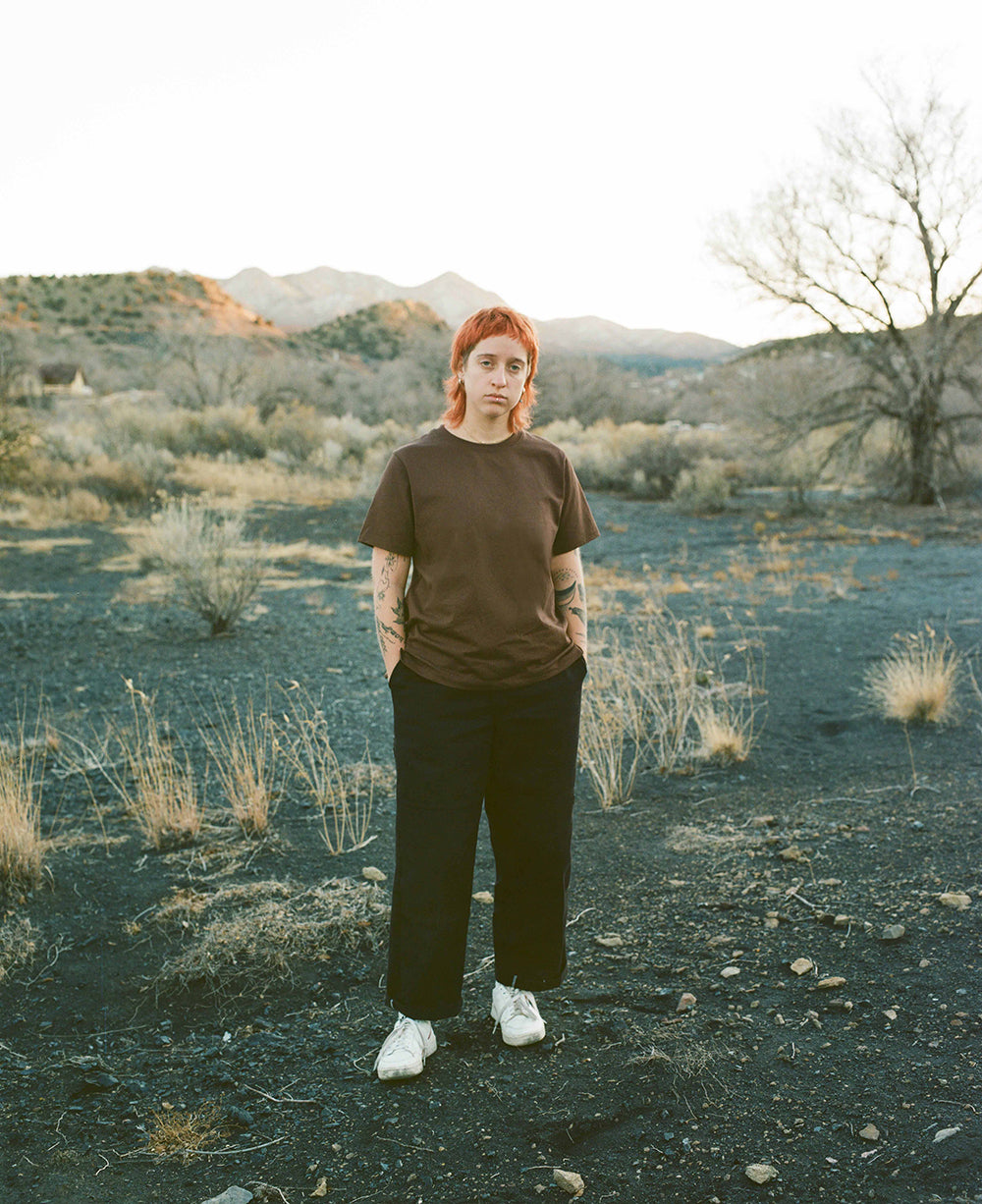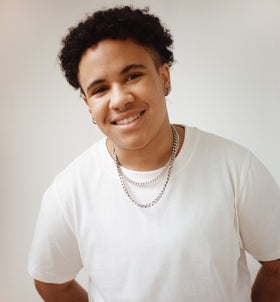
Feb 8, 2022
Both& New Mexico
Finnegan Shepard
Glyn, Artist, they/them xe/xem
Finn: Thanks so much for participating in this series. We really appreciate it. I like to start with a pretty open ended question, which is what is important to you for others to understand about your relationship to gender?
Glyn: I think there’s a couple of things that come to mind. One is that this is not a new thing, this is something that I’ve felt/lived my whole life. I just had the pleasure of finding the words to describe it through really generous community members and friends who supported me in navigating that. It’s always been this way.
Finn: What was it like to live in that identity without language?
Glyn: I grew up in Eugene Oregon, but in a rural area outside of the city, and so I really did not have openly queer friends. I didn’t have anybody in my life who was trans, until I got to college. At this point it’s still very much the vast majority of my life that I spent without any language to describe myself, so much of that experience was really confusing, and really uncomfortable. Not only with my gender identity but it also showed up with my sexuality alongside my peers, especially in high school. Feeling there was something I was missing about myself, this constant existential crisis, because there was this huge part of me missing. Social media played a part in having the support that I needed. When I went home over quarantine in 2020 I got on Tik Tok–I hate admitting this–but it gave me the trans community I had never had before. Seeing so many other people talk so openly about their experiences and being able to see myself in that and relate to that was honestly enlightening.

Finn: Yeah, I also have a complicated relationship to social media. I kind of looked down on it for a long time, but that experience of seeing other trans bodies and experiences played a literally critical role in my decision to medically transition.
Glyn: Social media is complicated. It’s really silenced a lot of creators I love and I’ve watched the algorithm wreak havoc on people’s jobs and livelihoods and creative outlets and so it’s very frustrating because we opened this huge incredible realm of possibility and then we started asking how can we make this so much like the rest of society with all of its issues.
I was talking with some friends last night about having Tumblr in 2012. Social media in different ways has shown me such a diversity of bodies and has helped me heal so much. I struggled with anorexia for much of my life, this year marks a year of active recovery. It’s interesting for me to see that over the last two years especially how much social media has helped me heal so much, but as a young child it created such toxicity/created the problems I had.
Finn: Wow, what an interesting way to put that. How do you even begin to square that circle?
Glyn: There have been so many conversations about censorship on the internet, how to keep it safe for kids. I was so entrenched in that part of the internet and the language we use about ourselves when you are deep in disordered eating. All these people feeding into each other of “oh I’m not sick enough,” and then you see them and see yourself and think that you can’t get help. That problem is across the internet, we see it in so many ways. There’s no simple way of how to fix that. I watched that community react really strongly to certain hashtags being blocked. For a long time dragonflies were a symbol for anorexia, it was a symbol you would wear in public to signal to each other. Intricate ways of trying to get around things that were being put in place to keep us safe.
But back to what I was saying before, about what is important to me for others to understand about my relationship to gender. The other thing that I struggle with a lot in trying to ask others to see me in my gender is that it’s really not just about memorising pronouns, which happens so often. It would be great if people didn’t mess up my pronouns and did the work to understand what it means for me to live outside the gender binary, but if I had to choose, I would prefer that people mess up pronouns sometimes but do the hard work to understand what it means to live outside the gender binary and to deconstruct their own ideas about that, and to be honest with themselves about how they live in that. It’s such a hard thing to ask of cis people because it is so easy to live in something that society has allowed to exist.

Finn: You're an artist, right?
Glyn: I am.
Finn: Tell me about that.
Glynn: We had dial-up internet until I was eleven or twelve. It’s probably good that I didn’t have access to the internet before I did. Because of that, because my mother is an artist, she raised us with a “lets learn how to make things mentality”. Every Christmas my sisters and I had a thing where everything we gave had to be hand made. One Christmas I made color pencil portraits of everyone in the family. We made each other a lot of stuffed animals. I honestly am still doing that. I learned to knit when I was 8. I started making stuff for my family. That joy of making things and using that as an outlet for energy as a kid–having that instilled at such a young age was very special and I’m grateful that my Mom had the time, and also took the time, to do that with us.
My art practice has been very self and community-taught since the beginning. I love how much that aligns with community in other ways, and the ways I said earlier, in terms of how my community has supported me in discovering my gender identity and sexuality. I know people who have studied stuff in college and that really works for them, but I really feel like I owe everything to the communities that I’ve been a part of.
Finn: I’m taking us on another sidetrack, but you mentioned earlier about the parallels or distinction between discovering sexuality and exploring gender identity: how do they map onto each other?
Glynn: In high school I felt pushed into identifying with certain terminology. I went through multiple stages of putting myself in a box and telling myself that I was comfortable there. It was really me looking for belonging in a really formative time in my life. A lot of people in younger generations (and mine) are experiencing this: there are so many ways you can speak about yourself, and a lot of people are looking for belonging in that, and there's nothing wrong with that, but I think that in every case that we see identity be categorised, especially in the English language, we see it always allowing identities to fall through the cracks. I’ve always felt it should be more about seeing the other person for how they describe themselves and how they are asking you to see them, instead of whether or not they identify with certain boxes out in the world or what terminology they use.
For me and a lot of my friends, the way that we talk about our gender identity is more personally important than finding labels for our sexuality. Also I identify somewhere within being agender, and talking to other folks like me I’ve heard this is common, this sense of not needing to identify with a box, because we’ve never felt we belong in a category. Social media tries to distill identity into being quickly understood and palatable. This explosion of terminology and incredibly nuanced conversations–seeing that, it complicates things for a lot of people in trying to really pin themselves down somewhere, when that’s often not true in our lives. Change is the only constant. The ways in which we identify ourselves will change through time, they will become more or less specific, they will feel more or less comfortable, and that’s really only up for discussion with ourselves.

Finn: Because I am ostensibly running a clothing company, I do have to ask–what about clothing? What has your experience been of trying to find clothing that fits and feels like an accurate representation of self?
Glyn: For so many trans people puberty is hell. For me, I hit puberty very early in life, and I was like why can’t I wear all the little boys pants I’ve worn my whole life? Especially growing up on a farm where workwear is necessary. I was really trying to navigate identity, not really knowing how to dress in different parts of my life. Not having the terminology in my life, literally everything felt so uncomfortable. My mindset was that if I could perform femininity perfectly, it would become comfortable. I will fit in, I will have that community I want. I will be valuable, I will feel comfortable with myself, I will have all these things that I’ve been taught to want in a very heteronormative society.
I took a year off before college and in that year and my first year of college I was around so many more queer people than I had ever been around, and also other trans people who had myriad of ways of expressing themselves. Clothing very much intersects with disordered eating and times with trying to hide my body or show my body and being uncomfortable with both. I spent my first years in college trying to explore that. It took a long time and is still something I think about a lot. Social media curates this very specific image of ourselves, and social media made me feel like I needed to have “my look.” I was bouncing around things. Honestly at this point I dress the way I did as a kid. It’s comfortable, it’s practical. My question is “can I go outside and play in this. Can I get this dirty.” I’ve found that I’ve very naturally moved away from certain kinds of clothing that are seen as traditionally feminine, but I ask myself if my moving away from things is because they are gendered or because I just genuinely can’t move in them the way that I want to. So much comes together with the body and how we try to clothe ourselves.
Finn: Anything else you want to share? What did I miss?
Glyn: Humans are just so many things. Hmm.
Finn: That’s a good ending. We can leave it at that.
Glyn: Yeah. Let’s leave it at that.
Photography by Mischa de Stroumillo



